
🏭🧑🏭Out in Science today: decarbonizing US electricity by 2035 only strands about 15% of capacity-years, based on typical lifespans. Setting explicit deadlines can help with the #JustTransition. 🧑🏭🏭
Paper: science.sciencemag.org/content/370/65…
Interactive map: emilygrubert.org/energy-transit…
Paper: science.sciencemag.org/content/370/65…
Interactive map: emilygrubert.org/energy-transit…
Decarbonization is two separate things: shutting down infrastructure that emits GHGs, and starting up infrastructure that doesn't.
I show with a new, generator-level model, that the Biden / DNC 2035 target for decarbonizing US electricity doesn't require massive asset stranding.
I show with a new, generator-level model, that the Biden / DNC 2035 target for decarbonizing US electricity doesn't require massive asset stranding.

Why does this matter? If I make you close your facilities earlier than reasonably anticipated without policy, there's an argument you should be compensated for the debt / lost revenue.
That could be expensive, & scary wrt the cost of closures PLUS building new stuff.
That could be expensive, & scary wrt the cost of closures PLUS building new stuff.
But: US fossil generators are old enough that a 2035 deadline would allow most capacity to complete a typical lifespan, based on plants w/ similar fuel & tech.
Only about 15% of capacity-years, & about 20% of direct plant/extraction job-years, get stranded by a 2035 deadline.
Only about 15% of capacity-years, & about 20% of direct plant/extraction job-years, get stranded by a 2035 deadline.
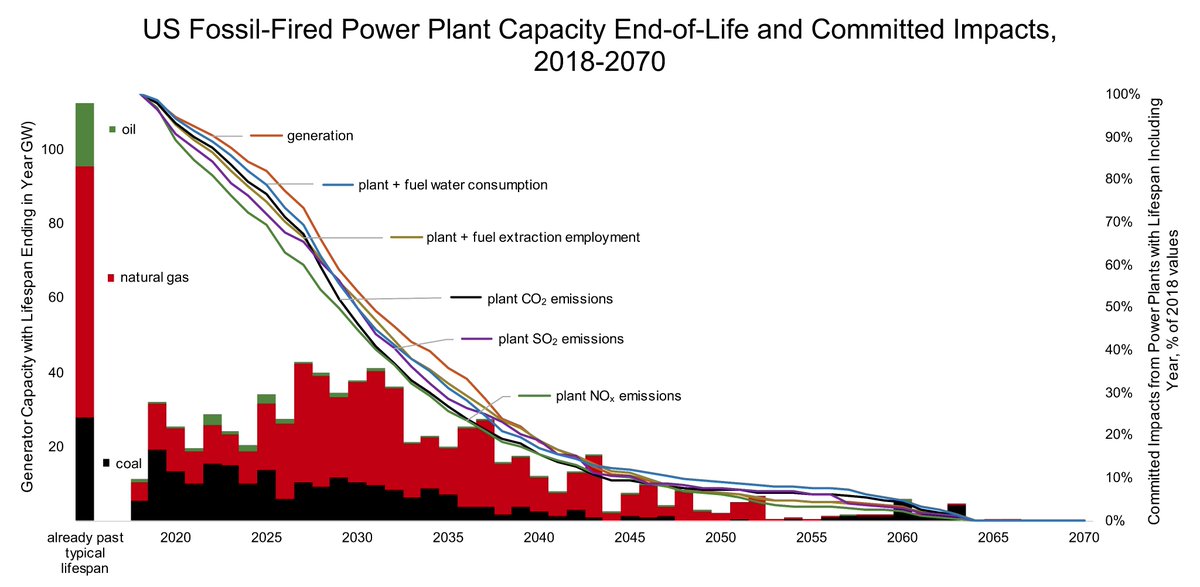
I’ll note up front that this is unusually low from a global perspective. We’re lucky, and we also thus have an even greater responsibility to be a fast mover here.
Still lots to think about on stranded assets outside power, and outside the US.
Still lots to think about on stranded assets outside power, and outside the US.
What does this mean? One ++useful thing about closing plants is that we know where they are, so we know who's affected.
Using policy, we can also declare when. Knowing both when & where a closure is due can enable specific, community-grounded planning for a #JustTransition.
Using policy, we can also declare when. Knowing both when & where a closure is due can enable specific, community-grounded planning for a #JustTransition.
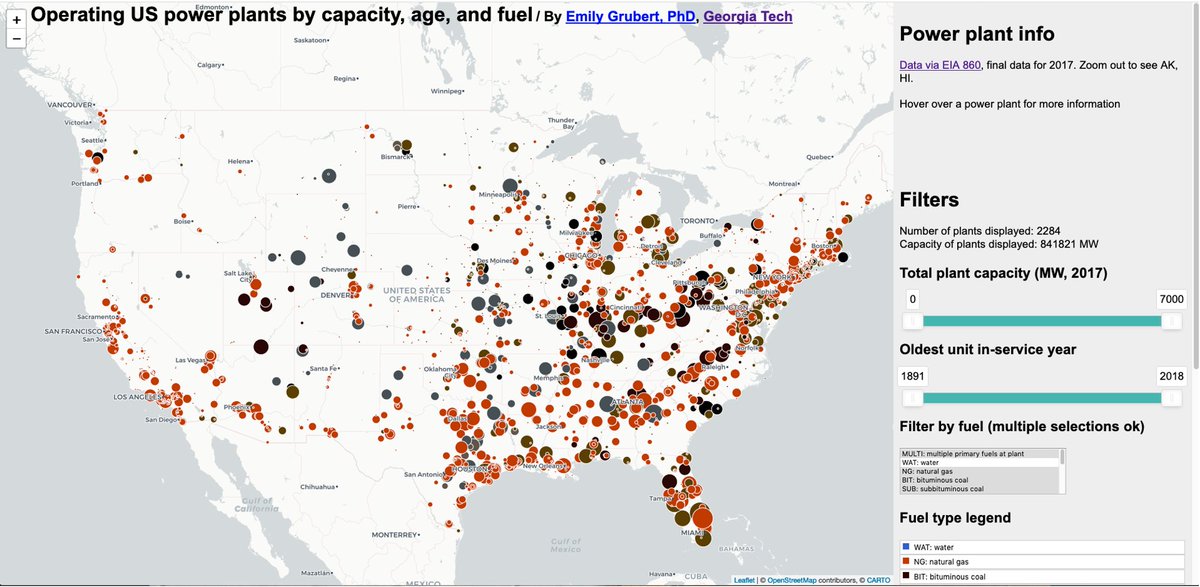
The facilities in question are real places, with driveways, meetings that start with safety moments, and break rooms with coffee pots covered in scale.
The people who depend on these places for wages and taxes are real.
The people who depend on these places for wages and taxes are real.
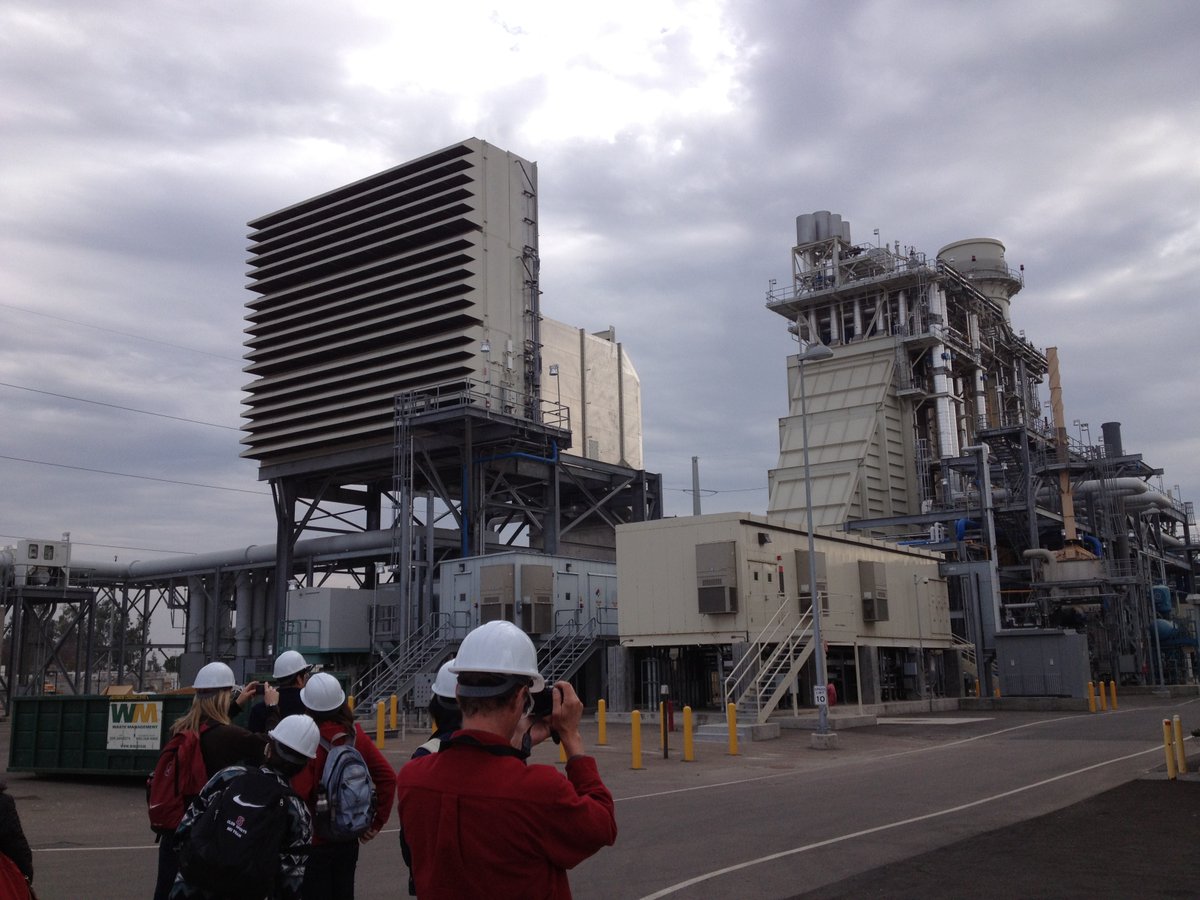
In 2018, they also emitted 1.9 Gt of CO2, 1.3 Mt NOx, & 14 Mt SO2, + consumed 3.2 billion m^3 of water, in 1248 counties.
People struggling thru local pollution, watching their roads flood on sunny days, their towns burn, & their jobs disappear w/ climate change, are real, too.
People struggling thru local pollution, watching their roads flood on sunny days, their towns burn, & their jobs disappear w/ climate change, are real, too.
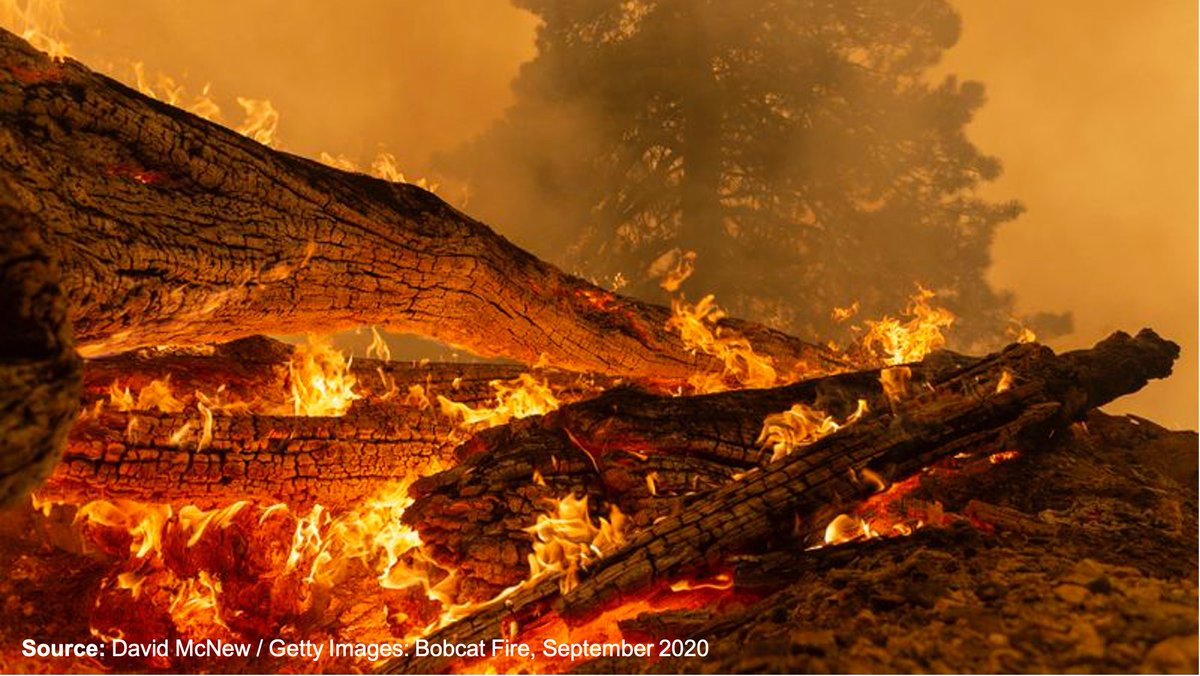
So we have to do it.
Closing this infrastructure will hurt people.
Not closing it will, and has, hurt people, too. More people (and some of the same people), and probably in far more permanent ways.
Planning ahead helps pretty much everyone.
Closing this infrastructure will hurt people.
Not closing it will, and has, hurt people, too. More people (and some of the same people), and probably in far more permanent ways.
Planning ahead helps pretty much everyone.
How do we plan?
What I model is when each of the US’ 10,435 fossil fuel-fired generators operable as of 2018 reaches its typical tech- & fuel-specific lifespan.
This isn't when they will close for sure – it’s "when does an asset get old enough that closure would be normal?"
What I model is when each of the US’ 10,435 fossil fuel-fired generators operable as of 2018 reaches its typical tech- & fuel-specific lifespan.
This isn't when they will close for sure – it’s "when does an asset get old enough that closure would be normal?"
My argument is that requiring generators to close at or later than this age doesn't strand them relative to reasonable lifespan expectations, and thus probably doesn't justify compensation.
What's crucial is that 2035 gives involved parties 10+ years to plan w/o much stranding.
What's crucial is that 2035 gives involved parties 10+ years to plan w/o much stranding.
If you haven’t already: go check out this great work by @EnergyandPolicy (specifically @DavidPomerantz & @Matt_Kasper) showing that utilities are broadly not going to get to the target voluntarily:
https://twitter.com/EnergyandPolicy/status/1334139620167016449?s=20
Planning, in community-grounded ways, is crucial for success. See, for example, this great piece by @resilientplaces, Mark Haggerty, @kelliroem, & @jacksonrose94 on how badly we need to do better: sciencedirect.com/science/articl…
We know we're bad at this. I've talked a bit #onhere about how we see echoes of the iron & steel industry collapse in that closures are essentially announced by pink slip, with big, bad impacts for people & places affected.
Such things are common in coal & will be common beyond.
Such things are common in coal & will be common beyond.
See, e.g., this great piece by @Maceyjoshua & Jackson Salovaara on how bankruptcies get used to discharge labor & environmental obligations: review.law.stanford.edu/wp-content/upl…
Or this fantastic reporting by @sydneyboles on the Harlan County miners' train blockade last year, a truly heinous situation where people not only didn't get paid, but had money /clawed back/ through direct deposit: rollingstone.com/politics/polit… 
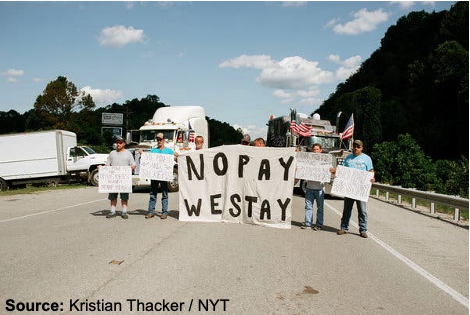
Planning can mitigate a lot of the pain. One really important caution is that we need to simultaneously commit fully to closures & allow for some flexibility as we bring the replacement system online.
I say more here:
I say more here:
https://twitter.com/emilygrubert/status/1325242643102752770?s=20
One reason we need flexibility is that we need to line up closures & openings to keep the power on.
From an asset stranding perspective, not building new fossil plants is probably the most important thing we can do. So we might need to keep some of the old ones a little longer.
From an asset stranding perspective, not building new fossil plants is probably the most important thing we can do. So we might need to keep some of the old ones a little longer.
But it's very important that it's clear the plants will indeed close.
Big differences in expectations for the future can be enormously damaging, as I show in this piece with Whitney Skinner: sciencedirect.com/science/articl…
Big differences in expectations for the future can be enormously damaging, as I show in this piece with Whitney Skinner: sciencedirect.com/science/articl…
Here’s a recent piece by @Lussenpop w/ same kinds of dynamics in Colstrip, MT, w/ "trauma" from uncertainty, + sudden closure:
"They're just like, 'Oh, we're done.' And it just leaves everybody hanging, nobody gets a chance to try and plan for anything."
bbc.com/news/election-…
"They're just like, 'Oh, we're done.' And it just leaves everybody hanging, nobody gets a chance to try and plan for anything."
bbc.com/news/election-…
So: what do we do?
Advance notice of closures is a huge one. It's a historically common demand by workers, & it makes sense due to the planning it enables.
Announcing a closure date in advance is not expensive! It does require commitment, however. No backsies.
Advance notice of closures is a huge one. It's a historically common demand by workers, & it makes sense due to the planning it enables.
Announcing a closure date in advance is not expensive! It does require commitment, however. No backsies.
Electricity is a pretty easy case tbh. So it is extra important we get this right. Not only is the industry not /that/ big, but we're likely to see new plants go up around old plants (transmission access), potential remediation jobs using people's existing skills in place, etc.
More broadly, though, my own opinion is that we really, really need to understand universal social programs as crucial to climate action.
Things like health care, pensions, living wages, etc. etc. etc. are HUGE reasons that it's a problem for people to lose their jobs.
Things like health care, pensions, living wages, etc. etc. etc. are HUGE reasons that it's a problem for people to lose their jobs.
Plus, it’s appropriate to be cynical when proposals consistently prioritize specific + substantial support for some groups (e.g., particular fossil workers – coal miners instead of gas station workers, for example) and not others (e.g., people affected by climate change).
As @ParrishB, @mmildenberger, & @leahstokes show here, linking climate action to broader social & economic programs also boosts support: doi.org/10.1088/1748-9…
Before this thread gets longer than the paper (do read it if you're interested; it's like 2k words, plus another 8k of methods & sensitivities, plus the generator-level model), let me just wrap up with a couple notes on where I hope this goes.
1) Model comes alive here: emilygrubert.org/energy-transit…, w/ gen / job / pollution / water metrics for plants (comprised of generators) thru 2075.
I hope for emergent uses, esp on things like local air pollution + whether plant vs extraction retirements drive the other.
I hope for emergent uses, esp on things like local air pollution + whether plant vs extraction retirements drive the other.
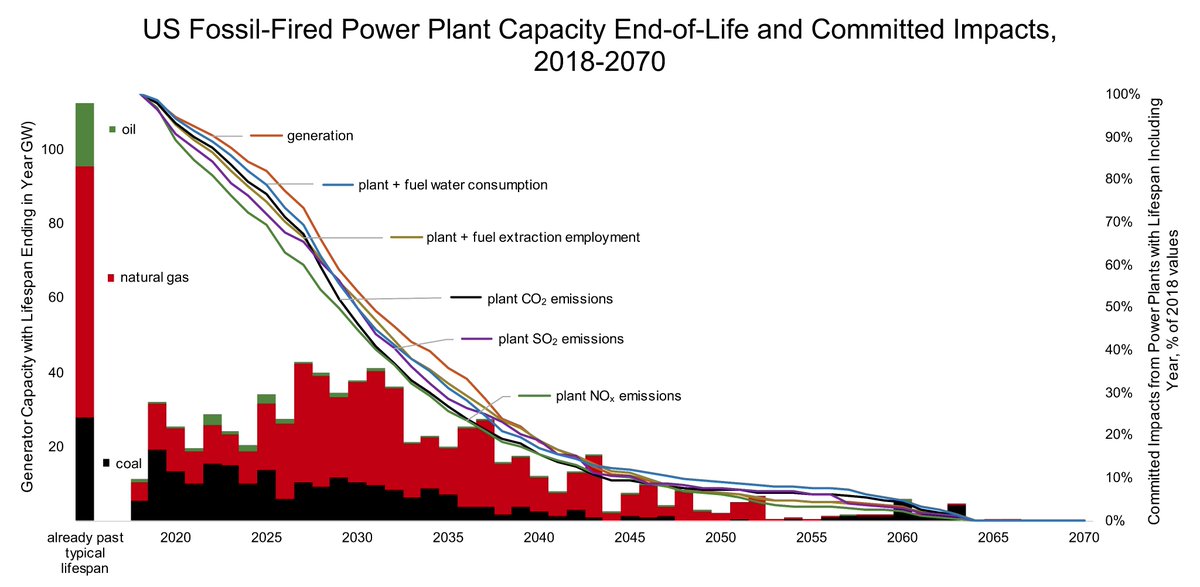
1b) Energy-water friends: I'm *so* excited that I finally got around to linking generator-level water consumption/withdrawal coefficients to lifespan expectations, enabling a view of “committed water” as well. Withdrawal vals in the data file.
[also: pubs.acs.org/doi/abs/10.102…]
[also: pubs.acs.org/doi/abs/10.102…]
2) If you like this, check out some of my other, similar work.
A map showing plant age (have I mentioned I'm obsessed with asset-level analyses?): emilygrubert.org/plant-age
An analysis of what plant age can tell us about committed emissions in California: iopscience.iop.org/article/10.108…
A map showing plant age (have I mentioned I'm obsessed with asset-level analyses?): emilygrubert.org/plant-age
An analysis of what plant age can tell us about committed emissions in California: iopscience.iop.org/article/10.108…
3) I'm talking about closures. There's so, so much to be done about what we're opening, too. Here's a great thread on what 0 by 2035 means, by @cleantechsonia:
https://twitter.com/cleantechsonia/status/1303769490509803520?s=20
4) We need so much more energy social science to make this all work. Please read, support, cite, and use.
For my fellow engineers: for me, at least, @info_iasnr is a fantastic organization with a great community that has been very supportive as I grew into my social science hat
For my fellow engineers: for me, at least, @info_iasnr is a fantastic organization with a great community that has been very supportive as I grew into my social science hat
Comments/questions/complaints/collaborations: find me here + at gruberte @ gatech.edu.
Thanks for reading!
Thanks for reading!
• • •
Missing some Tweet in this thread? You can try to
force a refresh






